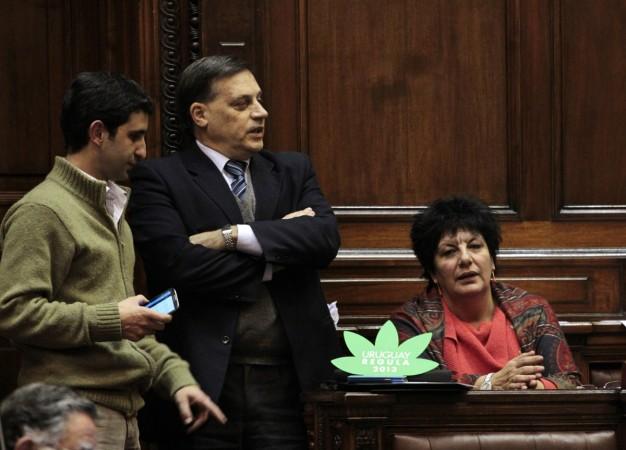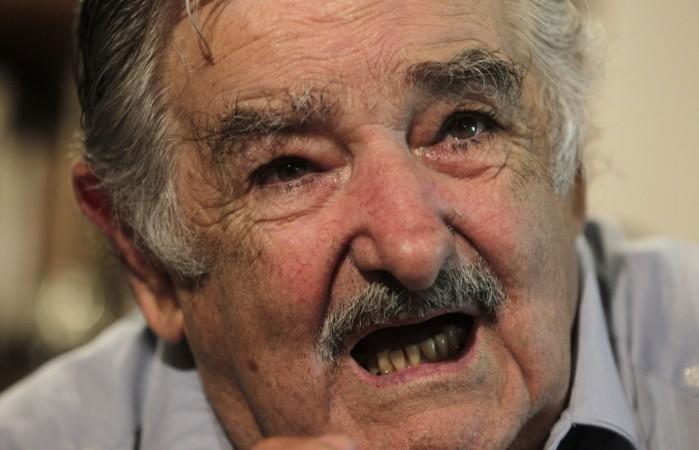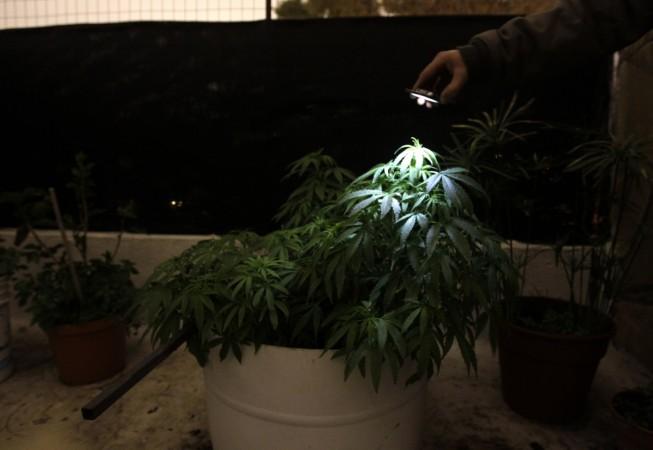![The Government of Kerala plans to gradually weed out alcohol in the state. [Representational Picture] Alcohol](https://data1.ibtimes.co.in/en/full/525310/alcohol.jpg?w=639&h=382&l=50&t=40)
Kerala seems to be headed towards the non-alcoholic way - the Gujarat way.
The government of Kerala has announced that it would slowly phase out the sale of alcohol in the state, over the next 10 years, to wrench its people out of alcoholic slumber.
Bar licences of 418 restaurants have not been renewed. The government outlets, which sell alcohol over the counter, account for most of the alcohol sales in the state. The government now plans to close down 10 percent of these shops every year, which would lead to the closure of all such shops in 10 years.
Kerala is known to be the highest consumer of alcohol in the country. According to a study, conducted in 2010-11, Kerala has a per capita alcohol consumption of 11.1 litres per annum, which is almost double than that of the per capita consumption of the rest of the country.
A substantial percentage of people who drink are reportedly below the age of 18. These statistics have prompted many anti-alcohol groups to voice their concerns over the increasing rate of alcoholism in the state, and how it has been leading to anti social elements.
However, will complete prohibition of alcohol solve most of the social problems in the state? Social activist and intellectual Sarah Joseph believes total prohibition only seems useful in theory. In practice, she believes, it could turn out to be a complete disaster.
"We tried it, but we failed," she said in an interview with The Economic Times.
It is a little known fact, that Kerala was once upon a time, a "dry" state. All kinds of liquor were banned in Kerala till the year 1967. The then Communist government, headed by EMS Namboodiripad, were the ones to lift the ban on alcohol in the state. At first, only 'toddy' (a drink made from coconut palms, which contains only 10 percent alcohol) and 'arrack' were available in the market. Later however, Indian Made Foreign Liquor (IMFL) shops were auctioned out by the government, earning the state government a handsome amount of exchequer.
However, the new regulations, which the state government seems to be en-route to impose, would ban the sale of alcohol in any bar (except at five star hotels). This could deal a big blow to not only the alcohol industry in the state, but also the common drinker.
The state government currently stands to lose out on almost ₹8,000 crore from the sale of IMFL alone. The fact that the sales from IMFL increased from ₹4,631 crore to ₹7,860 crore in 2009-2012, points out that the liquor industry has almost doubled its revenue in the span of three years.
However, there is another side to this story – the humanitarian side. Sure, the revenue has doubled, but social activists point out the increase in consumption over the years. Around 170 lakh cases of IMFL were sold in 2008-09, while that number increased to 241 lakhs by 2011-12. The state government of Kerala also earned its fair share of exchequer revenue of ₹3,621 crore in 2008-09 and ₹6,350 crore in 2011-12.
NL Balakrishnan, former photographer, and Malayalam film actor, who is also involved in pro-alcohol activism, and leads the group of his kind, named Forum for Better Spirit believes that banning alcohol in the normal bars, and making them available only in the five star hotels would only cause more harm to the low income drinking population of the state.
He points out to the time when former Chief Minister banned arrack and says that the finances of this part of the population took a major hit, as they had to buy the relatively more expensive IMFL, rather than the cheap country liquor. Also, many experts have drawn comparison to the pre-world war United States, where alcohol was an illegal product. Back then, the mafia had taken over the alcohol market, bootlegging the product, and selling them in the black market for much higher prices. The experts believe that complete prohibition could result in the increase in illegal activities surrounding alcohol.
Meanwhile in Uruguay
Uruguay, a country which has seen its fair share of cartel-related violence in its history, has been gunning for a completely different change. Over the past couple of years, the Uruguayan government has been trying to legalize marijuana in the South American Country.

The Uruguayan government came up with plans to legalize marijuana in the country in mid-2012, and the House of Representatives passed a bill that legalizes marijuana in the country. However, the law is yet to be fully implemented. The law was expected to take full effect from last month, but the government postponed the implementation of the bill till 2015, citing "technical problems".
At the forefront of this revolution in Uruguay is President Jose 'Pepe' Mujica, who believes that the legalization of marijuana is not essential for anything other than wrestling the illegal drug market out of the hands of the drug mafia, and into the hands of the government, who can regulate it in an ordinary manner.
Mujica says that the legalization of marijuana is nothing but an "experiment", and that his nation is the world's "petrie dish". Unlike many other people in the world, Mujica has no illusions about this law. He himself does not advocate the use of marijuana to anyone. However, the liberalist inside this former guerrilla-revolutionist says that people are free to make their own choices. However, when comes to the question of legalizing marijuana, he believes that this move is meant to counter the monopoly imposed in the drug market by the cartels, and starve them of their sour of income, which is widely used to cause drug-related violence.

"We call it a regulation of a market that already exists," said Mujica, in an interview to Vice. "Regulation, more than legalization. There's a whole clandestine market. We want to bring it to legality, identify it."
Although Uruguay is considered to be one of the most peaceful countries in South America, the authorities say that drug-related violence has gone up in the country over the past few years. Around 9,000 people have currently been imprisoned in Uruguay. Out of them, around 3,000 of them are in jail because of narco-trafficking crimes.
"What does that mean? That three out of nine incarcerations are drug-related. First and foremost we need to fix that," says Mujica.
The main motive of the government here is to muscle the cartels out. How will they do that? They plan to produce better quality of marijuana, with 15 per cent or less concentration of Tetrahydrocannabinol (THC), a compound that gives marijuana the intoxicating quality. Also, they intend to sell this product at a very cheap rate ($1 for a gram), making it almost impossible for the cartels to compete in the market. In short, the Uruguayan government is trying to use economics to root out the drug-related violence in the country. Also, the government would allow every Uruguayan citizen would be allowed to grow their own marijuana plant.
However, all this would be done in a regulated manner. Every citizen who buys or grows marijuana must register their name in the country's database. And people who grow marijuana, would only be allowed to grow six plants every year. Also, citizens of the country would not be allowed to buy more than 40 grams of marijuana from the government. The government would regulate the amount of marijuana a citizen consumes. If the consumption goes beyond a certain level, the government would refer that citizen to a proper rehabilitation programme. Marijuana would not be sold to people below the age of 18 and people who are not the citizens of the country.

This policy by the Uruguayan government is not so popular in the Uruguay itself. A recent survey shows that 64 per cent of the Uruguayan citizens are against the legalization of marijuana. However, many marijuana advocates believe that this is because of the restrictions imposed by the government on the amount of marijuana the people can consume. How much this is true, is of course, a matter of opinion.
However, there is no guarantee that this policy would be a success. There is a very big chance that this elaborate plan might just blow up in the Government's face, much like one of the Molotov Cocktails that the cartels use in their organized crime. Drug related violence does not just stop at marijuana. Uruguay is one of the highest consumers of cocaine too.
If and when the government muscles out the cartel in the marijuana market, the underground organizations that were thriving solely on the demand for marijuana, might look to move on to the other drugs markets as well. This could very well lead to a full-scale drug war, in the country.
If such a situation does arise in the country, the government might have to move towards the legalization of other drugs too, or go back to square one by banning all kinds of narcotics. Mujica however, does not seem to be looking that far into the future. He intends to take things one step at a time, as he considers this as an experiment.
The governments of Uruguay and Kerala seem to be heading in two completely different directions, with one trying to legalize marijuana to curb organized crime, while the other trying to ban alcohol, to reduce alcohol related violence, both domestic and otherwise. It is impossible to say, at this juncture, whether either or both, or at least one of these policies would prove to be beneficial to the society. However economically, it seems, the Uruguayan government stands to gain a deeper purse, while the Kerala government stands to lose out on one of its biggest sources for revenue.

















